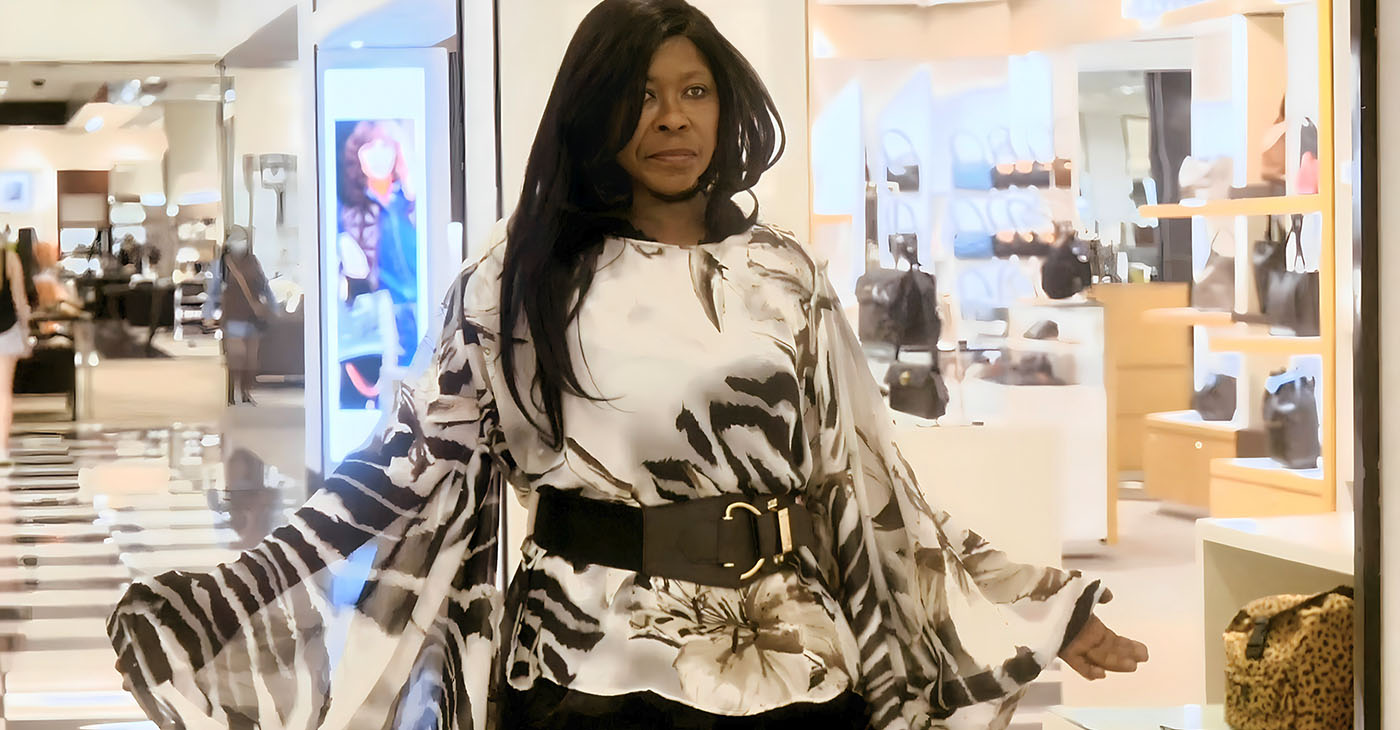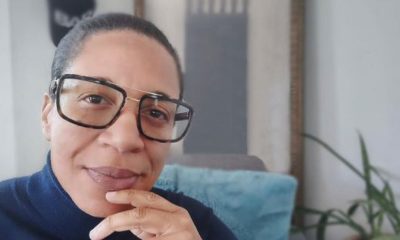Fashion
Black hair took the crown at Sister Spokesman event
MINNESOTA SPOKESMAN-RECORDER — Hair enthusiasts of all ages packed into a suite at Thor Companies in North Minneapolis for a wide-ranging conversation that touched on everything from the importance of representation and self-love to healthy scalp and hair maintenance and proper hair care for children.
Black hair, in all its diverse glory, was the topic of the day at Sister Spokesman’s “Wear Your Crown” event.
Hair enthusiasts of all ages packed into a suite at Thor Companies in North Minneapolis for a wide-ranging conversation that touched on everything from the importance of representation and self-love to healthy scalp and hair maintenance and proper hair care for children.
“There’s never been a better time for Black women in history,” declared panelist Faatemah Ampey, celebrity stylist and owner of SuiteSpot and Salonspa. She cited Viola Davis, Lupita Nyong’o and others as high-profile examples of Black women succeeding while serving up bold, natural looks.
“I think we have to learn how to have courageous conversations with people about our identity and our beauty,” added Ampey when asked how to find a sense of comfort when encountering not-so-nice Minnesota workspaces. “We should lose some of our defensives because people don’t know what they don’t know. It is our responsibility to educate people.”
“We’re taking a few steps forward and few steps back,” added panelist Briana McCall Cress, owner of Gorgeous Looks Salon, in reference to recent news stories involving Black hair. “But we have more images in the media and more people who are being intentional about putting [their] Blackness first and showing who we are, loving who we are, and accepting that we’re remarkable.”

Attendees packed into Thor Companies for a discussion about hair. (Photo by: Steve Floyd | MSR News)
Essence Shabazz, owner of E.bazz Hair Loft Beauty Supply, rounded out the panel. She encouraged attendees to know their worth from the inside out and to prioritize spending habits. “Take care of your home first. I see us spending so much on wigs and weaves when we can’t afford it.
“If you don’t own your own home but you’re spending $500 on a weave — that is insane! If you want a certain look, but can’t afford it, ask [your stylist] how to achieve it for less,” she advised.
The event was moderated by Stephenetta (isis) Harmon, MSR editor-in-chief, Hype Hair digital editor, and owner of Sadiaa Hair+Beauty Guide, a beauty directory for women of color. In addition to the discussion, attendees shopped with local entrepreneurs, networked and vibed to sounds from KMOJ’s Q-Bear.
Next up: Sister Spokesman talks love and relationships at the Minneapolis Urban League on June 1 from 12-4 pm. RSVP @ Sister Spokesman/Facebook .
See a Facebook live stream of the event here and here.
Connect with the panelists at the links below:
Briana McCall Cress @ gorgeouslookssalon.net
Essence Shabazz @ ebazzhairloft.com
Faatemah Ampey @ suitespotsalonspa.com
Stephenetta (isis) Harmon @ sadiaa.com
This article originally appeared in the Minnesota Spokesman-Recorder.
Art
Phyllis Emelda: Oakland’s Global Designer Extraordinaire
Beyond the runway, on Sundays Emelda opens her East Oakland home as a design studio and modeling training ground. With woodshop and home economics no longer taught in high school or middle schools, Emelda says youth and young adults are missing out on key opportunities.

By Carla Thomas
Black Friday and Small Business Saturday had to make way for Black Out Sunday with Phyllis Emelda Designs and Company on Sunday, Nov. 26, at the Veterans Memorial Building in San Leandro. The event opened a gateway to the local fashionista’s global couture, kicking off the holidays in style with all the glitz and glam the audience could handle.
The full afternoon of fashion, food and fun produced by Woman in the Moons Productions featured models blazing the runway with one-of-a-kind designs for bodies of all sizes. From women’s fashions and menswear to children’s clothing, Black Out Sunday also featured emerging artists Kandy Kyriakou and Phyllis Emelda’s own granddaughter Reya Renee, among others.
Entertainment by Mercenery, formerly Graham Central Station, a Tavia Percia theatrical production and Dr. Yvonne Cobbs’ gospel explosion also complimented the lineup.
During the event, guests were able to jumpstart their Christmas shopping with vendors offering a variety of handmade gifts, garments, jewels and crafts. A portion of the proceeds benefitted the Healthy Living Foundation, founded by Dr. Yvonne Cobbs.
Beyond the runway, on Sundays Emelda opens her East Oakland home as a design studio and modeling training ground. With woodshop and home economics no longer taught in high school or middle schools, Emelda says youth and young adults are missing out on key opportunities.
“I view the fashion industry as a whole, including product development, creative design theory, sales, marketing and presentation. I have students of all backgrounds. Currently one from India, one from DuBai, and five college graduates, including a scientist, chemist, and two engineers.
“My students and participants are ages 5 – 75 years old. My 6-year-old granddaughter is already illustrating her designs.
“We are working on bringing the program into the Oakland public schools and Recreation Centers in the near future. I currently offer this training free of charge to Oakland Inner City Youth, which is my target market for training.”
In February 2022 she was selected Emerging Designer for New York Fashion Week.
“I took 17 inner city hopefuls to New York Fashion Week for an experience of a lifetime,” she said. “My 6-year-old granddaughter was the youngest-ever model for NYFW.”
Phyllis Emelda & Company began as Blaize in 1991, having grown to four locations in Bay Area malls.
By the late 90s she began working with a slinky fiber and developed a line of seven interchangeable garments suitable in style for most women. This collection was called “Wardrobe In A Box.” The explosive success of the collection landed her in a spot on a roadshow program with Costco Stores. After an exhausting 18 months of working on the road, Emelda fell ill and then her mother passed away. “The devastation took its toll, but I knew I had to reinvent myself yet again.”
She began marketing her collection to boutiques nationally and contracted with Walmart Stores to bring her Travelwear Collection to Sam’s Club. She also contracted with Seams To Fit in Berkeley, Grand Diva Salon in Florida, The San Francisco Opera House, Thunder Valley Casino Resort, and Zulily.com. Her line was then qualified by the Art Commission as Wearable Art.
“During the pandemic, my team and I launched Drama Dressing, The Couture Collection-(Just Coats by Phyllis Emelda) and an updated version of “Wardrobe In A Box” shown for the first time at New York Fashion Week 2022.
“This year was great, but I have much more in store for 2024,” she said.
For more information visit: www.phyllisemelda.com
Bay Area
Jayda Curry – God, Family, Hoop
The UC Berkeley Cal Bears Women’s Basketball team has a new fireball of energy and excellence by way of sophomore Jayda Curry. While she is a star basketball player, her motto is GOD, FAMILY, HOOP — in that order.

By Y’Anad Burrell
The UC Berkeley Cal Bears Women’s Basketball team has a new fireball of energy and excellence by way of sophomore Jayda Curry. While she is a star basketball player, her motto is GOD, FAMILY, HOOP — in that order.
Jayda was born in Corona, California, and has played basketball since age four. Growing up, she would play golf with her father occasionally, but Jayda gravitated to basketball along with her sister Layla Curry, who plays for LMU. Jayda chose a unique academic track studying American Studies with an emphasis on Interdisciplinary Studies (ISF), where students choose the classes they would like, which can cross multiple disciplines.
Jayda shared that her priorities in life are consistent and have not changed even with her popularity as a star basketball player. Her faith in God keeps her grounded, and she has an extensive gospel song playlist on her phone and a routine of not listening to rap music before Noon every day. Instead, her music therapy playlist has many songs from several religious genres of music and a short list of her favorite artists: Marvin Sapp, Jessica Reedy, Jonathan McReynolds, Kirk Franklin and many others.
Athletes often have the challenge of balancing their mental health and sports careers, and Jayda found a balance through journaling, something she has done for a long time, well before entering college. Finding a healthy balance with academic success is often, as well, a challenge for athletes. Jayda attributes her success in this area to good time management. Staying tenacious about studying and completing school assignments while on the road with the team has become a habit that gives Jayda academic success while performing at a high level on the basketball court.
Jayda cherishes her love for family and shares how deep down she is truly a ‘kid at heart.’ A Lego wonderland moment and enjoy hanging out with family, teammates, and friends is the best for Jayda on any given day.
Jayda has many athletes that she admires. To name just a few, they are
Candice Parker, Sirena Williams, Gabi Douglas, Steph Curry, Damion Lillard and many more. It was no surprise to hear that she would like play for the WNBA one day, but succeeding in college is just as important to Jayda.
Jayda is well on her way to gracing the national stage while fulfilling her dreams and aspirations, given the path she has chosen and thus far managed well. Soon she may be another big name in basketball for other up and comers to admire.
But her fashion career is happening in real-time, not in Jayda’s future. She launched an apparel collection that can be found in Oakland stores and online at www.jaydacurry.com. Jayda’s collection will also be available in stores in her hometown of Corona.
Activism
California Bill Allowing Parents to Sue Social Media Companies Moves Forward
“For every parent like me who is anxiously watching their children grow older in the digital world, there are millions of others whose teens (and often, even younger kids) are already experiencing the mental health impacts of a system that has a moral responsibility to protect them,” said Assemblymember Buffy Wicks (D-Oakland). “Our No. 1 job as legislators is to protect the health and safety of Californians — especially our kids and teens — and I’m proud to jointly author this bill that takes that responsibility as seriously as it deserves.”

By Edward Henderson, California Black Media
Last week, the State Assembly voted 51-0 to pass a bill that, if the state Senate approves, would open the door for parents whose children are addicted to social media to sue companies like Tik Tok and Meta, the parent company of Facebook and Instagram.
Assemblymembers Jordan Cunningham (R-San Luis Obispo County) and Buffy Wicks (D-Oakland) co-authored the legislation, Assembly Bill (AB) 2408.
The bill’s language defines ‘addiction’ as children under 18 who are “both harmed – either physically, mentally, emotionally, developmentally or materially – and who want to stop or reduce how much time they spend on social media but can’t because they are preoccupied or obsessed with it.”
Cunningham says evidence of social media addiction affecting children is well documented and it’s time to hold social media companies accountable.
“According to whistleblowers, certain social media companies have been designing their products to get children addicted. The results have been calamitous for our youth: anxiety, eating disorders, body dysmorphia, depression, and loneliness,” he said.
“It’s time we treat the dangers of youth social media addiction with the level of seriousness it warrants,” Cunningham continued.
Wicks says as the mother of two daughters, the bill is particularly relevant for her.
“For every parent like me who is anxiously watching their children grow older in the digital world, there are millions of others whose teens (and often, even younger kids) are already experiencing the mental health impacts of a system that has a moral responsibility to protect them,” she said. “Our No. 1 job as legislators is to protect the health and safety of Californians — especially our kids and teens — and I’m proud to jointly author this bill that takes that responsibility as seriously as it deserves.”
The bill permits parents to sue for up to $25,000 per violation. If proven that a company intentionally created products that were meant to be addictive to children, they could face an additional $250,000 civil penalty.
Only social media companies that have had at least $100 million in gross revenue would be liable under the proposal. It would not apply to streaming companies like Netflix and Disney Plus.
If passed, AB 2408 will also allow guardians and the California Attorney General to sue social media companies.
The bill has drawn opposition from several business groups including the California Chamber of Commerce and TechNet, a network of tech CEOs and executives.
They argue that the bill would impose an “unimaginable civil liability” on social media platforms and “interferes with the expressive rights of both the minors who will be banned from social media services and the service providers themselves.”
TechNet alleges that the bill is unfair and extra-legal.
“There is no social media company, let alone any business that could tolerate that legal risk, especially considering how much this bill puts the thumb on the scales of justice for plaintiffs,” TechNet wrote in opposition.
If the bill becomes law, it will take effect on Jan. 1, 2023. Then, social media companies would have until April 1 to remove features deemed addictive to children to not be held liable.
Also, companies that conduct regular audits of their practices and features to identify products or offerings that could be addictive to children would be immune from lawsuits.
AB 2408 is now headed to the State Senate for review.
-

 Activism4 weeks ago
Activism4 weeks agoOakland Post: Week of March 27 – April 2, 2024
-

 #NNPA BlackPress4 weeks ago
#NNPA BlackPress4 weeks agoCOMMENTARY: D.C. Crime Bill Fails to Address Root Causes of Violence and Incarceration
-

 #NNPA BlackPress4 weeks ago
#NNPA BlackPress4 weeks agoMayor, City Council President React to May 31 Closing of Birmingham-Southern College
-

 #NNPA BlackPress4 weeks ago
#NNPA BlackPress4 weeks agoBeloved Actor and Activist Louis Cameron Gossett Jr. Dies at 87
-

 Community1 week ago
Community1 week agoFinancial Assistance Bill for Descendants of Enslaved Persons to Help Them Purchase, Own, or Maintain a Home
-

 Activism3 weeks ago
Activism3 weeks agoOakland Post: Week of April 3 – 6, 2024
-

 Business1 week ago
Business1 week agoV.P. Kamala Harris: Americans With Criminal Records Will Soon Be Eligible for SBA Loans
-

 Activism2 weeks ago
Activism2 weeks agoOakland Post: Week of April 10 – 16, 2024























































